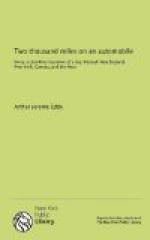About fifty minutes were given to a thorough examination of the machine. Beyond the tightening of perhaps six or eight nuts there was nothing to do, everything was in good shape. But there is hardly a screw or nut on a new automobile that will not require tightening after a little hard usage; this is quite in the nature of things, and not a fault. It is only under work that every part of the machine settles into place. It is of vital importance during the first few days of a long tour to go over every screw, nut, and bolt, however firm and tight they may appear.
In time many of the screws and nuts will rust and corrode in place so as to require no more attention, but all that are subjected to great vibration will work loose, soon or late. The addition of one or two extra nuts, if there is room, helps somewhat; but where it is practical, rivet or upset the bolt with a few blows of the hammer; or with a punch, cold chisel, or even screw-driver jam the threads near the nut,—these destructive measures to be adopted only at points where it is rarely necessary to remove the bolts, and where possibilities of trouble from loosening are greater than any trouble that may be caused by destroying the threads.
We left Kendallville at ten minutes past seven; a light rain was falling which laid the dust for the first two miles. With top, side curtains, and boot we were perfectly dry, but the air was uncomfortably cool.
At Butler, an hour and a half later, the rain was coming down hard, and the roads were beginning to be slippery, with about two inches of mud and water.
We caught up with an old top buggy, curtains all on and down, a crate of ducks behind, the horse slowly jogging along at about three miles per hour. We wished to pass, but at each squawk of the horn the old lady inside simply put her hand through under the rear curtain and felt to see what was the matter with her ducks. We were obliged to shout to attract her attention.
In the country the horn is not so good for attracting attention as a loud gong. The horn is mistaken for dinner-horns and distant sounds of farmyard life. One may travel for some distance behind a wagon-load of people, trying to attract their attention with blasts on the horn, and see them casually look from side to side to see whence the sound proceeds, apparently without suspecting it could come from the highway.
The gong, however, is a well-known means of warning, used by police and fire departments and by trolley lines, and it works well in the country.
For some miles the Professor had been drawing things about him, and as he buttoned a newspaper under his coat remarked, “The modern newspaper is admirably designed to keep people warm—both inside and out. Under circumstances such as these one can understand why it is sometimes referred to as a ‘blanket sheet.’ The morning is almost cold enough for a ‘yellow journal,’” and the Professor wandered on into an abstract dissertation




